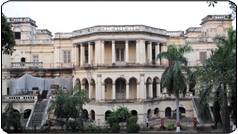Roshan-ud-Daulah's Kothi
It has been the case with most of the States in India, and it was the same with the rule of Nawabs in Awadh, that corruption in its administration was a dominant factor that allowed the East India Company to use the nobles and officers of the Court to be unfaithful to the Nawabs or Kings and pre-empt resistance to their cunning devices.
The employees of the Nawabs profited from both sides [the King and the British Resident as well]. When they feared any action and expected the King's wrath, they were protected by the British, who would shelter them and even provide a source of income for their sustinance at Kanpur or any other place under their control. We have the examples of two Chief Ministers of Awadh as such. Coincidently, both of them built palatial buildings that vied in their lavish extravagance, decoration and ornamentation with the King's palaces.
One of these Chief Ministers was Mohammed Hussain Khan, mostly known by his title of Roshan-ud-Daulah. He held the Chief ministership for a major part of the second King, Naseer-ud-Din Haiders reign (1827-1837). Having the backing of the British East India Company and with the King's liking for European ways, he was unhindered in deriving much benefit for himself and his near and dear ones.
He obtained a salary of Rs. 25,000 per month, besides an annual allowance of five lakh for household expenses. Over and above this, he was entitled to receive a commission of 5 per cent on the revenue collection of the State, which amounted to nearly 5 lakh per annum. His two wives received monthly allowances of five thousand and three thousand respectively from the State treasury. Later, his son [Mohammed Hasan Khan] was appointed the Chief commander of the King's army, and his salary was fixed at five thousand per month. The annual income of the Chief minister's household was estimated to be above 15 lakh, not all of which was earned through just and fair means.
It is not unusual then that the Kothi built by Roshan-ud-Daulah for himself in the Indo-French style was unique in its grandeur and vied with the palaces built by the Nawabs and Kings of Awadh. When H.G. Keene [in A Handbook for visitors to Lucknow] described the Kothi in 1896, he said that it was 'a still more fantastic structure than the great palace itself with which, however, it tallies well. Iconic columns, balustrades with globe like finials, Moorish minarets, Hindu umbrellas, arches, pediments, lanterns are all blended in a confusion which the eye may long seek vainly to disentangle, and surmounted with a gilt band'.
Post-Mutiny photographs of the original Kothi show a semi-circular gilt band on the top of the six storeyed building. Four square kiosks with canopies in the French fashion, along with small chhatries and gumbads (dome) appear at a lower level. They also show an impressive garden and a small mosque attached to the building on one side.
After the death of Naseer-ud-Din Haider, his uncle Naseer-ud-Daulah, later called Mohammed Ali Shah, was crowned the King and within three months of his rule, Roshan-ud-Daulah was dismissed from his post. He was charged with financial misappropriation and fined a sum of 20 lakh with imprisonment. However, with the help of his British patrons and their proteges, Roshan-ud-Daulah managed to get the jail term waived, but his palatial Kothi, estimated at three lakh, was confiscated and he was ordered to leave the State. He went to Kanpur and settled under his British patrons.
The Kothi of Roshan-ud-Daulah fascinated the last King of Awadh, Wajid Ali Shah so much that he made it the residence of his then favourite Queen, Mashooq Mahal and also gave it the name Qaiser Pasand (Ceaser's choicest)
With two of its upper storeys demolished along with the gilded arch, Kothi Qaiser Pasand or Roshan-ud-Daulah kutchery (as it is more popularly known, since it had the District Courts during the British rule) now houses the office of the State Archaeology Directorate and the District Election Office.
Source:
Hindustan Times, City Scan, A Time in History
Wednesday 1.10.1997 — Gilded legacy of Qaiser Pasand Kothi

